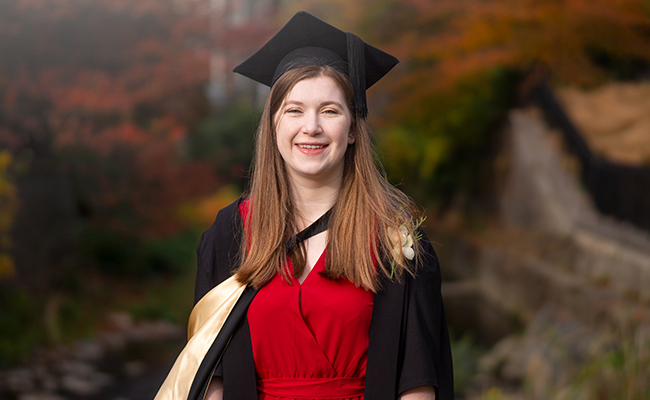Tuesday 11 May 2021 10:29am

Brittany Jones graduated with a Master of Applied Science with Distinction in Quantitative Genetics on Saturday. Photo: Daniel Chong.
When Brittany Jones joined the parade of new graduates donning caps and gowns on Saturday, it was the end of a long journey of study filled with some serious challenges.
Brittany, who was the first person to graduate with a Master of Applied Science with Distinction in Quantitative Genetics, has ankylosing spondylitis, a form of inflammatory arthritis that affects the spine and pelvis. She battled severe pain all through the second year of her undergraduate Bachelor of Biomedical Science degree and was diagnosed with ankylosing spondylitis just an hour before her final exam that year.
“What I like about the idea of genetic counselling is that you get these really rare conditions. There might only be 20 people in the world with them. I find that really fascinating, and you’ve got this opportunity to help someone who is really struggling.”
“I was the cultural representative at one of the residential halls in Dunedin, which is like being a Resident Adviser (RA) – it is quite a lot of work on top of your university studies, and then I was having this horrible pain that no one was giving me an answer for. It was really bad, especially in the mornings, when I would be limping to lectures.”
Since her diagnosis she has had good times and bad times, she says. With a diagnosis she was able to get treatment and her arthritis went into remission. She worked as an RA in her third year, demonstrated and tutored undergraduate papers, and in 2020 worked as a research assistant in the Department of Surgical Medicine.
She wasn’t out of the woods yet, however.
“The end of 2020 was really hard. There was a point where I wasn’t sure if I would finish my Master’s studies in time to graduate. My grandmother died in October, the day I arrived back in Wellington to start a new job, and I was still trying to finish my Master’s. It was a bit rocky.”
2021 has been a better year. She’s enjoying being back with her family, has a new kitten, and she’s settling into the work force.
Brittany’s long term goal is to become a genetic counsellor, and work with patients and families who have genetic mutations which put them at increased risk of developing particular diseases.
She chose to study the Master of Applied Science in Quantitative Genetics after discussing her options for postgraduate study with Senior Lecturer in Quantitative Genetics Dr Phil Wilcox.
“I wanted to focus on statistics, and I also wanted to try and get some clinical experience if possible. I was at a talk that the Genetics Department was doing about different postgraduate options and he talked about the Master’s programme.
“I went up and talked to him afterwards about how I was interested in genetic counselling and so we came up with a research project that would let me look into genetic counselling and planning a genetic screening project, and that also helped me get the statistics skills.”
All the way through her studies, Brittany, who attended St Oran’s College in Lower Hutt before moving to Dunedin to study, has worked towards well-defined goals.
“My motto has always been to do my very best and be happy with that. As long as I can say I tried my hardest at something, to the fullest capability, then I can be satisfied and proud of my work. If I got a bad grade but I worked really hard, I would be happy with that. It’s always about trying to do the best you can.”
She is now working as a Research Technician with the Epilepsy Research Group on the Wellington campus. The group investigates the genetic causes of epilepsy and Brittany’s role includes liaising with families, extracting DNA samples and analysing genetic results.
Having grown up with a friend who had epilepsy, and having been a paediatric patient at Wellington Hospital herself for her severe childhood asthma, it’s a job that is close to her heart.
She also hopes the experience she gains on the job will help her work towards her goal of becoming a genetic counsellor.
“What I like about the idea of genetic counselling is that you get these really rare conditions. There might only be 20 people in the world with them. I find that really fascinating, and you’ve got this opportunity to help someone who is really struggling. If you’ve got asthma or a common epilepsy there are lots of resources available, whereas with these rare diseases people are really struggling and they don’t know what to expect. If you can help them through that, then I feel like that’s something really amazing.”
